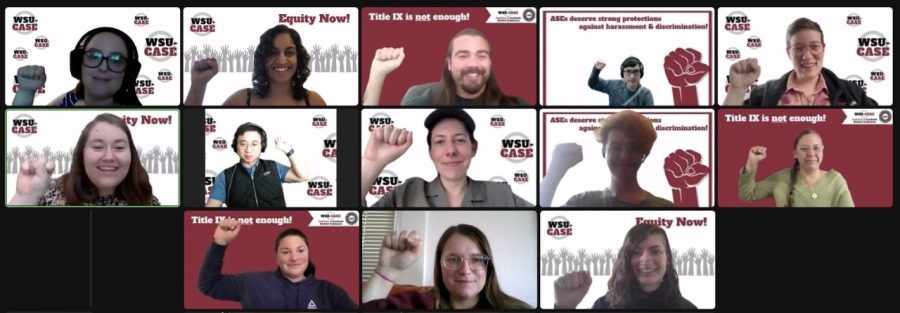WSU student union negotiates anti-discrimination policies with management
WSU CASE held Equity day event on Monday, Zoom meeting presenting proposals watched by over 150
WSU CASE are currently negotiating their first contract.
April 27, 2023
WSU Coalition of Academic Student Employees, the recently formed Academic Student Employee union, is currently negotiating with WSU management to change anti-discrimination and harassment policies, specifically with issues going through the Title IX office.
“We are WSU Academic Student Employees (ASEs), who pride ourselves on being part of the community of hard workers that make WSU a world-class institution. However, many of us have experienced a lack of secure rights and protections in the workplace, struggle with low compensation, grapple with inadequate health care, and face uncertainty about our futures. We are therefore working together to form a union to create a stronger and more equitable WSU,” according to their website.
Aurora Brinkman, clinical psychology doctoral candidate, is a member of the bargaining department for WSU-CASE. She said improving WSU’s discrimination and harassment protections was one of the biggest reasons the union was formed.
“Improvements have been advocated for a long time and things haven’t really changed,” Brinkman said. “With the current system that exists, people are kind of frustrated with the outcome. They’re not seeing the support that they need.”
WSU-CASE has only been officially certified since November 2022 and they are currently negotiating their first contract, said Brinkman. The union is currently in the process of changing the current anti-discrimination policies, which state that concerns must go through the Title IX office.
“The issue with that is that a lot of people do not report to the office because there’s a lot of retaliation that can occur, there’s not a set timeline going forward,” Brinkman said. “The protections that we are trying to implement through our proposals is making sure that we can address discrimination and harassment through this process.”
There have been efforts to unionize at WSU for at least a decade, Brinkman said. Improving these conditions for those who have concerns to come forward will encourage more to do so, which many are discouraged to do now.
“There’s a lot of academic workers unionizing across the country,” she said. “WSU is one of the most recent.”
The bargaining process, which has been in progress since February, is projected to possibly last until fall, Brinkman said. One of the biggest sticking points in the bargaining meetings has been that management claims that revisions to federal Title IX policies have made it so that all harassment or discrimination claims have to be addressed through the Title IX office.
“Through bargaining, management has been saying that all harassment and discrimination should be handled only through the Title IX office here, which is CCR, the Civil Compliance and Civil Rights office,” Brinkman said.
Brinkman said management does not believe that the union grievance process and Title IX can work together, unions at other universities like UW and University of California have shown that they can and that having access to both processes gives the survivor/reporter agency in dealing with the issue they are bringing forward.
On Monday, during the last bargaining session of the semester, CASE held an event called Equity Day, Brinkman said. Equity Day was meant to raise awareness and present CASE’s proposals to management.
“We’re going to be presenting proposals related to anti-discrimination and harassment proposals, international and immigrant student rights, promoting a respectful work environment,” she said. “We’re trying to get as many people as we can to come to that Zoom session who are part of our bargaining unit.”
Brinkman said improvements to harassment and bullying policies are extremely important because higher education has the second highest rate of harassment and bullying of any institution, second only to the military.
In addition, a recent study reported by Science.org found that “71% of respondents who experienced bullying did not report the behavior to their institution, mostly for fear of retaliation. Of those who did report, only 8% found the process to be fair and unbiased.”
Yiran Guo, engineering doctoral candidate and bargaining committee member, said he is a member of the bargaining committee as well. He attended Equity Day over Zoom.
“We had testimonials from students and alumnus sharing their experiences about some of the really egregious things that happened to them,” Guo said.
Guo said Equity Day had a much larger number of people than usual bargaining committee meetings. Usually, there are only the members of both bargaining committees at the meetings.
“At one point we had over 150 people in the room, although that includes the admin and other people in the room,” Guo said.
The effort to unionize has been going on for years, although the pandemic made it harder to coordinate in person, Guo said. Although the bargaining process has only just started, WSU CASE already has a strong presence.
Brinkman said supervisors at WSU have a lot of power over the progress students make in graduate school and for their future careers, which makes it less likely a student will report through Title IX.
“Having these protections in place and having a clear timeline in mind, we believe it will really help and we will see the improvements seen in other academic worker unions,” Brinkman said.
Shannon Kozlovich, 2019 PhD student from WSU Spokane, is one of the people who gave testimony during Equity Day.
“When I walked into a PhD program, I figured it would either be similar to the schooling I did for my bachelor program or similar to a job, since I was getting paid. It was a very very difficult and rough transition,” Kozlovich said. “I went ahead and pulled a few of my experiences in terms of sexual harassment and anti LGBT rhetoric that I faced from the person who was in charge of my employment at that time.”
Kozlovich said she hopes that Equity Day may help convince members of WSU management to adopt WSU CASE’s proposals, because the current system is not working for many students she said. As someone who has had experience with unions since graduating, she said WSU CASE has done a good job in organizing.
“There are a lot of other unions that have those types of proposals that got into their final contracts,” Kozlovich said. “I do think there’s a huge disservice that WSU and a lot of other academic institutions do to PhD students in driving them away from ever wanting to be in academia. They’re creating this feedback loop where the people who stay in academia are the people who don’t face discrimination in academic institutions.”
Acacia Patterson, teaching assistant in the physics and astronomy department and member of the CASE bargaining department, said she has been involved in organizing for a union since her second semester at WSU.
“As soon as I heard people were doing that, I was on board, because I came from an undergraduate program that has a grad student union,” Patterson said.
Patterson has done some work with the anti-discrimination and harassment workgroup. She said Equity Day was created as a way to show how important these points are to them.
“WSU admin said we would not be able to include those protections in our contract,” Patterson said. “We wanted to flood the Zoom room with all these faces. Usually, it’s 10ish members in the WSU bargaining committee and we usually have about 10 members as well.”
Patterson said the proposals shown on Equity Day include addressing creating a respectful work environment, anti-bullying policies, and harassment and discrimination training.
“Right now [harassment and discrimination training is] this online thing that all students have to complete,” Patterson said. “It’s not very long or informative and doesn’t help people mitigate these issues. We proposed something more robust and informative.”











